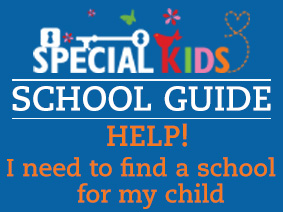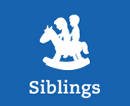How to Navigate Love and Special Needs
Have you thought about what happens when your child with special needs falls in love or wants to date? It might be more manageable than expected.
Gloria McGuire and Sandy Higgins are looking forward to being mothers-in-law. McGuire’s daughter Elise, 25, and Higgins’ son Carter, 25, are engaged—they’ve been dating for seven years after clicking at a Special Olympics outing to the circus.
“That night, I remember they were laughing together and being very playful,” Higgins recalls, joyfully, “and from there they just wanted to spend time together more, and over the years it grew and eventually they started talking about getting married.
“Carter loves Elise with all of his heart, with this pure, sweet, innocent love. It’s beautiful.”
Both Elise and Carter have Down syndrome, and McGuire says she had always hoped Elise would experience a love like she has with Carter.
“When Elise was born, my hope for her was that she could of course have the same experiences and joy I’ve had,” McGuire says. She believes her daughter has found that with Carter. “They really love to spend time together as much as possible and they FaceTime every night,” she reveals.
Carter’s father, Russ Higgins, sits on the board for Dallas-based nonprofit 1st Life Planning, an organization that provides housing for adults with special needs. He points out that the need for love and connection is universal, and it is vital for parents of children with special needs to realize that in this way, their child is no different than anyone else.
“They want the same thing as everyone else wants,” he explains, “so why wouldn’t they deserve to have it? It’s a huge part of life.”
Russ Higgins expresses what many parents of children with disabilities feel: a desire for their child to know the joy of being seen and loved as a whole person, to be chosen and accepted in a way that goes beyond friendship, to experience the soul recognition of being loved by a partner who is happy to see you, to know you, to spend time with you—and, as in Carter and Elise’s case, to choose to spend the rest of your life with that person.
This might require parents to overcome some fears and practical worries. For the McGuires and the Higginses, it was simply a matter of choosing to focus on the basic fact that Carter and Elise are fulfilled by their companionship, and then finding ways to support that through communication, logistics and the occasional work-around.
“When they started talking about marriage, for instance, Russ said they needed to wait until they were 31 because that’s the age he was when he and Sandy were married,” Gloria McGuire recounts, “so that gave us some time to figure things out like logistics.” For example, the families are still working out a housing situation that would be the most comfortable for everyone. “But it’s all worth it,” McGuire says. “It’s worth it to us for them to have each other.”
Love is not a Special Need, it's a basic need
When Abraham Maslow created his hierarchy of needs, he said that after basic needs like sleep, food and safety, the need to feel love and develop a sense of belonging in relationships is fundamental. Susan Wood, the executive director of the Hope Center for Autism in Fort Worth, says she sees this need in the young adults she mentors.
“Most every one of these young adults reach a place in their development where they recognize love as a need,” Wood says. She helps her young adults uncover unspoken social rules that we all need to manage day-to-day life, and as her mentees mature, relationships can become part of that social learning.
“Many of them experience feelings of love in different ways,” she explains. While none of her young adults are in successful relationships currently, she says in their own ways many of them have expressed a desire. “Many of the adults I have worked with are lonely,” she points out. “Their parents are a couple, their brother and sister-in-law are a couple, and they want that companionship for themselves.”
For some parents, the idea of their child dating or falling in love may seem scary because it requires a lot of vulnerability. But Russ Higgins says that as a father, the experience is not different from when Carter’s neurotypical siblings started dating.
“It’s like everything else with being a parent, this dating stuff,” he explains. “It has been happening since the beginning of time. We just have to let them fall on their face sometimes and experience things. That’s what life is about.”
How important is having "The Talk?"
Yet teens and young adults with disabilities often lack key conversations about love, dating and sexuality, says Jessica Stone, assistant director for the Office of Disability Access at the University of North Texas. In her previous job, Stone helped young adults with special needs as they transitioned to careers. “My job was to help people with disabilities with work-related issues, but I spent so much time talking to them about relationships because their parents had sheltered them so much,” she confides.
Parents may be tempted to overlook topics like sexuality, safe sex practices and online dating because they have a hard time seeing their adult children with special needs as individuals with the same biological and emotional needs as their typical peers. Plus, “the talk” might require a different approach to make sure their kids fully understand.
Wood’s discussions with young adults with autism begin at a place of friendship. “I ask, ‘Are you interested in being friends with him or her?’” she says. “We start there because if they can’t be friends or if their friendship skills are not developed enough, the relationship will be superficial.”
She explains that for individuals with autism, conversations about love and dating might involve explaining social norms or other people’s perspectives. “For instance, I was talking to a boy who seemed interested in a girl at work, and he was frustrated because he said nothing was happening,” she says. “When we walked back through their last interaction, the girl said hello to him and he said hello back. I asked what he did next, and he said he walked away. So we had to talk about how the girl may have perceived that, what she may have thought.”
Stone agrees that pushing past the discomfort of having these conversations about dating and especially sex is critical because parents are often the sole source of information. “Yes, we may have to explain things in a different way or even use something like appropriate pictures to explain it, but we still have to have those conversations,” she says. “Their neurotypical counterparts have so many more opportunities to observe how relationships go, but in kids with cognitive disabilities or even other disabilities like being visually impaired, they aren’t having those chances to observe and learn that way. Someone has to tell them.”
Ignoring the issue and not addressing things like sex can cause long–term problems, according to Stone. “You cannot ignore that, biologically, this is going to be an urge,” she says. “I counseled many individuals with even mild cognitive processing who got pregnant and when we talked about it, I was shocked to hear how little sex education they had.”
For McGuire, talking to Elise about dating happened over a series of conversations that started as Elise and Carter began dating. “Elise and Carter’s mental development is different than ours,” McGuire says, “so we talked a lot about what is appropriate and what’s not, about respect and how we treat each other.”
McGuire says the open dialogue made it easier to have more difficult conversations about sexuality. “They are alone together sometimes, and I may have wondered if it was OK at first, but ultimately it was talking to Elise that made me more comfortable,” she says. “They like to snuggle and show affection, but Elise knows the boundary and has no problem saying that, and because Carter’s parents talked to him, he knows to respect it.”
Parents should play a Supporting Role
The McGuires and Higginses agree that their job is to support Carter and Elise’s relationship but also give it room to grow and be what it is, instead of trying to interfere and direct it. That support involves handling logistics and honoring their kids’ desire to be married by figuring out how to make it work in a way that is realistic but still meaningful.
They say that teaming up with other couples to provide a weekly date night is a great way to support the connection. Carter and Elise have a regular group date with two other couples; the parents take them to do something fun together every Friday. “One thing they can’t do is drive,” says Russ Higgins, “so we have to provide means for them to get where they want to go. We work well with the other families, and that has been good.”
As Carter and Elise’s 31st birthdays approach, their parents also have to think about how the couple can experience marriage in a way that works for their needs. Sandy Higgins says that communication between the families has been very helpful. For instance, Carter wishes to have children one day. Though that might not be biologically possible, the families knew they needed to address it. Gloria McGuire took the lead and talked to Elise about the responsibility of having a child. “Elise can be bossy,” she says with a laugh, “so we knew that she would probably set the tone for that. I just told her that having a baby is painful and a huge responsibility, and she said she didn’t think she would like that.”
“Gloria talked to Elise, and then we told Carter that it would have to be something he and Elise would need to talk about,” Sandy Higgins adds. “Elise is pretty clear that she does not want to [have children] for the reasons she and Gloria discussed, so we were able to help them navigate that themselves by just talking to them and letting them talk to each other about it.”
Stone says that the McGuires and Higginses have the right idea—helping overcome barriers that make dating more difficult, but then standing back and allowing for a relationship, or even a breakup, to happen.
When Heartbreak Happens
Though Carter and Elise are completely committed now, when they first started dating, Russ Higgins could see how much Carter adored Elise and worried about what might happen if they broke up. “With any child, you don’t want to see your child’s heart broken,” he says. “I did think about it and felt unsure how I would explain it to Carter if that happened.”
“It’s hard to date as a person with a disability, and I can say that from personal experience,” Stone reveals. In addition to counseling people with disabilities, Stone herself is blind. “But breakups are part of life and we all experience them,” she continues. “Parents just have to explain why people break up, and that most people have multiple relationships that don’t work out before they get married.”
Parents may also have to do emotional damage control before any relationships begin.
“I have one young man who thinks he will be alone forever,” Wood says sadly. “He wants a girlfriend and he talks about it all the time, but he worries he will never find one. We talk about it often.”
Wood emphasizes the importance of discussing the joys and concerns that go along with romantic relationships—or even unrequited crushes. She says communication is key in helping people with autism understand what they are feeling and why.
“Many [of the young adults I coach] have had crushes that did not pan out,” she says, “and it’s very hard on them. I tell them that’s sort of the first step: You have a crush that does not work out, and that’s why they call it a crush.”
Stone says that of course feelings of sadness and loss are normal, but parents should also trust their instincts and look for anything beyond the pale. “If they seem depressed, the sadness continues for longer than it probably should, they become fixated, then it may be time to look at how you are helping them to understand and process it and to find a counselor who can help them to process it,” she advises.
Yes, the thought of a child experiencing this kind of sadness is scary, but parents should not get bogged down in the potential for heartbreak. Both parents and experts agree that dating and finding love is a beautiful thing for a person with a disability, as well as for their family.
“I would tell parents to embrace the utter joy of it,” says Sandy Higgins. “It’s truly an amazing and happy thing to sit back and watch, and of course provide support and guidance. It has been a really neat thing for us to see how Carter and Elise love and support each other.”
Save the Date!
Elise and Carter’s parents tout the group date as a wonderful way to allow your child space to date and get to know their romantic interests in an easy and laidback setting. The pair go out weekly with friends; parents take turns driving and planning events that range from elaborate to low-key. Here are some great ideas to start you off.
Bowling: This is affordable and simple, allowing for interaction in a structured environment. It’s also really fun!
Movies: A sensory-friendly movie showing is a great first group-date idea—because it allows everyone to get accustomed to being together without being over-stimulated through a lot of interactions. Many AMC theaters offer sensory-friendly showings for people who don’t do well with too much stimulation, and Alamo Draft House hosts “Alamo for All” screenings.
Baking: For a more advanced date that incorporates some life skill practice, try a baking class! Williams Sonoma, for example, offers baking parties at their locations. An instructor will walk your daters through baking and decorating cookies or cakes and may offer additional helping hands if needed.
Home dates: Fix some snacks and have a craft, game or karaoke night at home! Just be sure to give your daters enough space to make it their own.
#datingwithadisability
When your teen or young adult says they want to start dating, where do you turn? The hashtag #DatingWithADisability has emerged as a way to connect with advice and relevant articles. Search the hashtag to learn more about what your child may be feeling; the YouTube videos, Instagram accounts and other media can also help your child realize they’re not alone in their dating frustrations.
For a frank discussion on sex and disability, GaeLynn Lea’s TED Talk “Sexuality and Disability: Forging Identity in a World That Leaves You Out” (available on YouTube) may be a good diving-in point for parents.






























